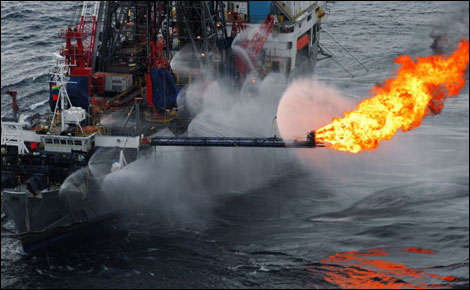Ghana is losing 5,000 barrels of oil per day as a result of re-injection of gas into the wells.
The Jubilee partners have no option than to choke production by 5,000 barrels of oil per day to make way for successful re-injection of 120 million standard cubic feet of gas every day.
The re-injection has been occasioned by the lack of plant to process the gas.
On April 14, 2014, the FPSO Kwame Nkrumah completed the 100th off-take from the Jubilee fields’; followed closely by the production of the 100 millionth barrel on May 4.
Mr Charles Darku, General Director (GM), Tullow Oil Company, said that if the gas processing plant was in operation, 70 million standard cubic feet of gas would have been taken care of by the processing plant every day while between 45 million and 50 million cubic feet of gas would be re-injected every day.
He explained that the re-injection of 45 million and 50 million cubic feet of gas is what should be done every day at the Jubilee fields to sustain oil production at optimum level.
However, he said because government policy bans flaring of gas, they had to be re-injecting 120 million standard cubic feet of gas every day, thereby choking production by 5,000 barrels of oil per day.
Consequently, he said Tullow was collaborating with Ghana Gas Company to install a by-pass facility to provide an alternative route to give a limited processed gas to the Volta River Authority (VRA).
Mr Charles said the FPSO has the capacity to process 30 million standard cubic feet of gas a day and the by-pass facility will carry the gas directly to VRA thermal plants.
He said the imported equipment for the project had already been imported and arrived in the country last Tues-, day, with installations expected to begin this week.
He explained that the by-pass facility is not taking over from the Ghana. Gas Processing Plant, but would serve as a back-up facility when the plant breaks down or shuts down for routine maintenance.
Mr Darku said the collaboration centres mainly on engineering assistance in terms of quality and installation procedures and did not go into any agreement on financial assistance.
He said the collaboration was necessary to find quick solutions to the problem while government continues to find ways to complete the gas plant.
The GM noted that for now the company is re-injecting gas back to the wells, and assured the public that their engineers are on the ground and are monitoring their operations very critically.
“For now, we are managing the situation well and we are comfortable at the rate at which we are re-injecting and we will continue to do that to avoid damaging our reservoirs,” he said.
Mr Darku said the company spent $100 million in developing the third gas rejecting ,well last October to augment the existing two wells.
He said though it turned out to take less gas than expected, there is enough space in the other two wells to accommodate the capacity being injected currently.
Answering a question on how long the company would continue to re-inject gas, Mr Darku said the decision is in the domain of the engineers, who are monitoring the issue on daily basis and would offer an advice when they reach their ultimate limit.
“I can assure you that we do not have imminent problem, at hand now. We are currently re-injecting 120 mil-lion standard cubic feet of gas daily and we are comfortable with that, but we also want to urge government and Ghana Gas Company* to facilitate work on the plant to the benefit of all,” he added.
Earlier, there was an investor forum to take stock of the company’s performance in 2013 and strategies for 2014.
The forum was an annual event after the Shareholders’ Annual General Meeting (AGM) in London.
The 2013 AGM took place last week, during which the company declared a dividend of 12.0 pence per share.
Ian Springett, Chief Finance Officer of Tullow, said the company had also recorded a net debt of S1, 909 million as against $989 million in 2012, an increase 93%.
He stated that the company paid the Government of Ghana $300 million last year.
He said $130 million was spent on local suppliers, explaining that over 40% of Tullow Ghana’s contracts under $100,000 were awarded to local businesses, as well as 24% of contracts between $100,000 and $1 mil- ; lion were also awarded to local businesses.
Source: Business Finder


